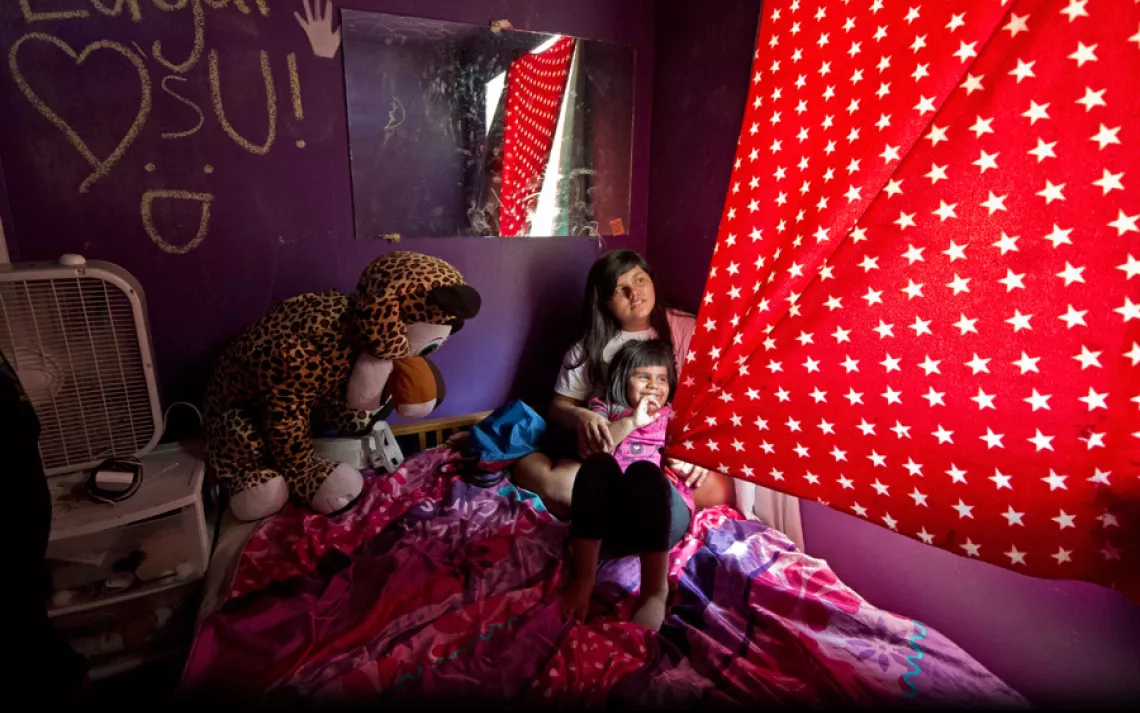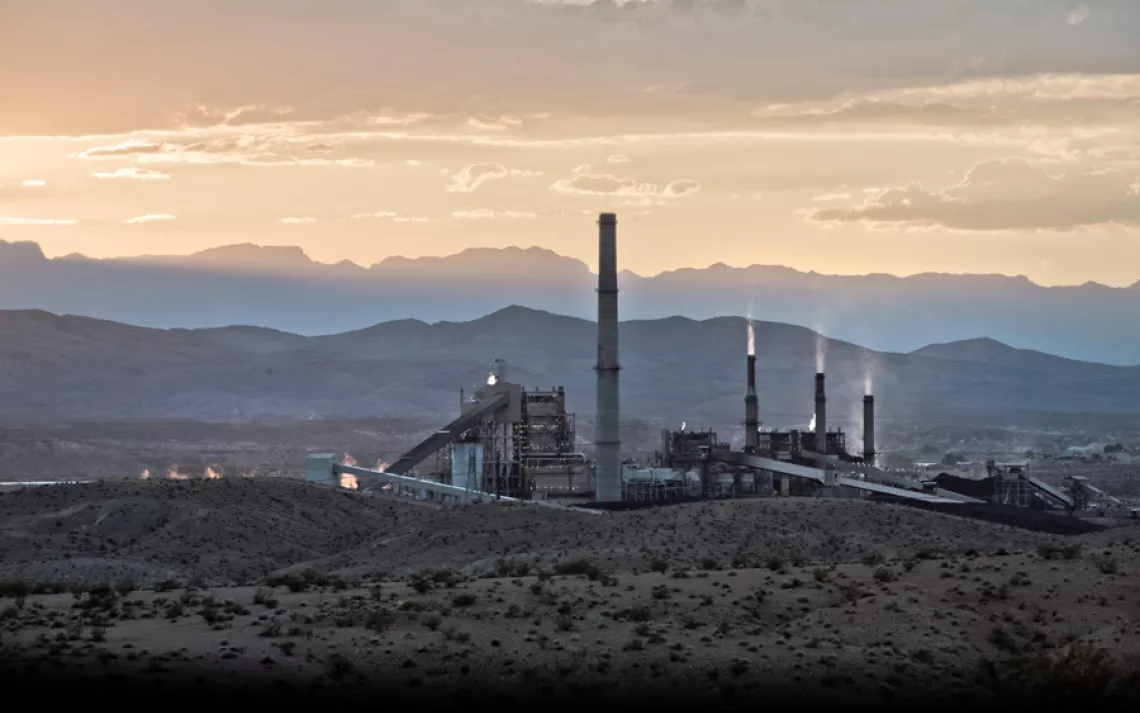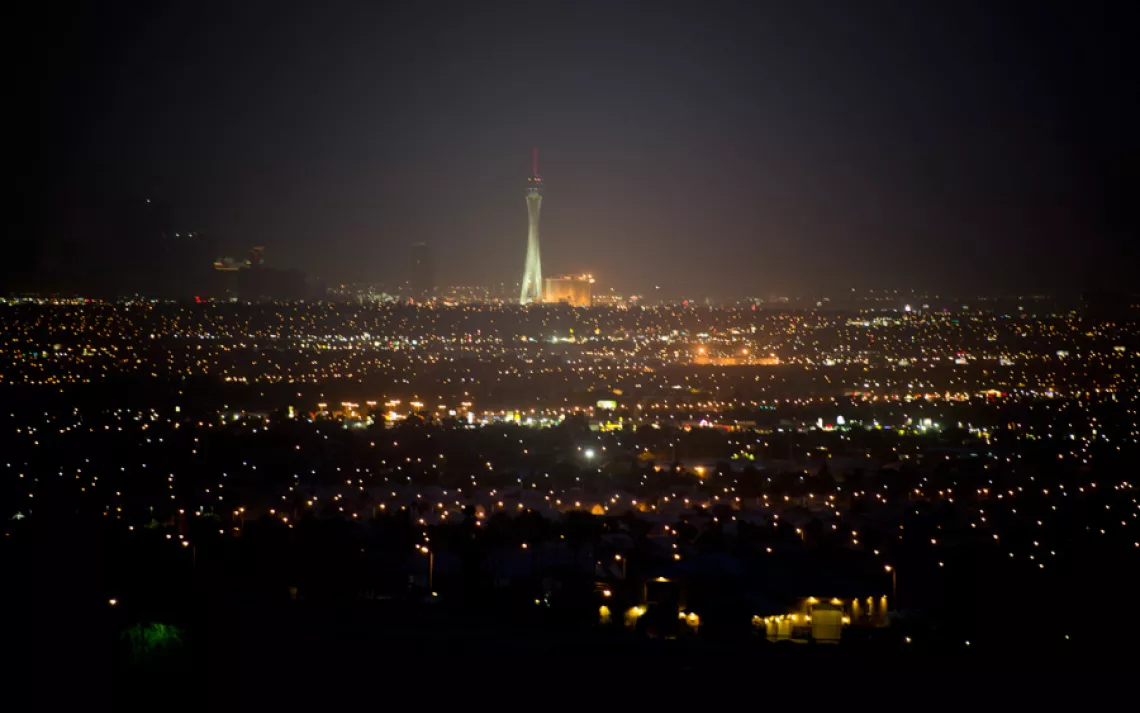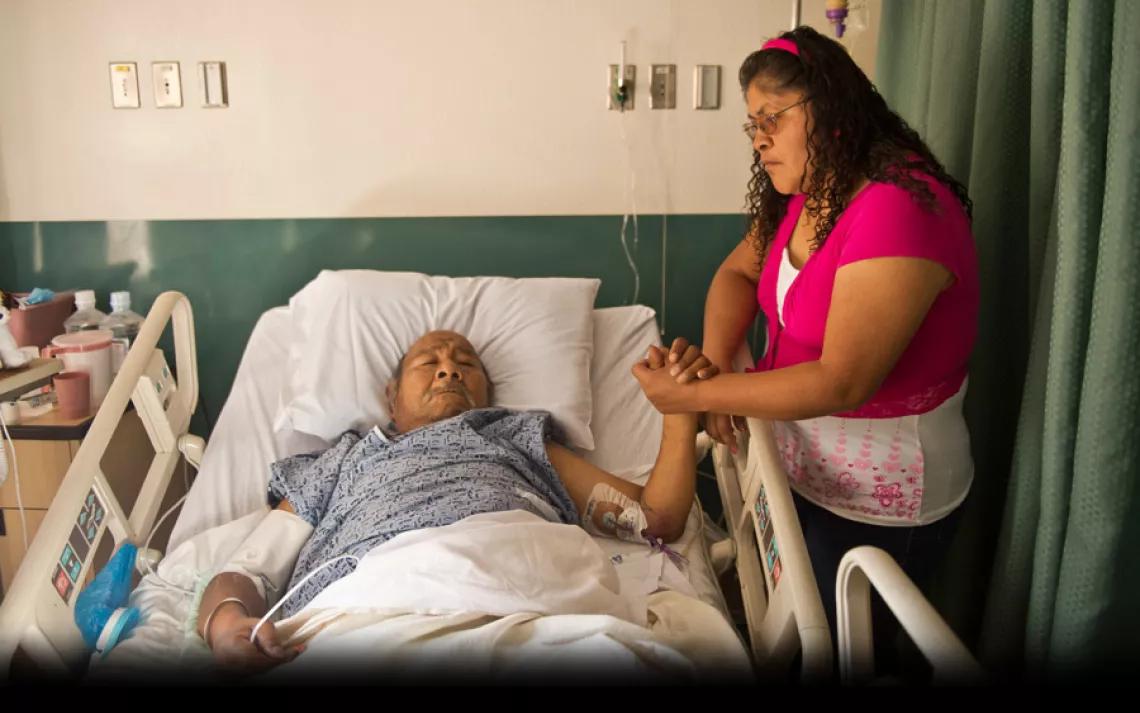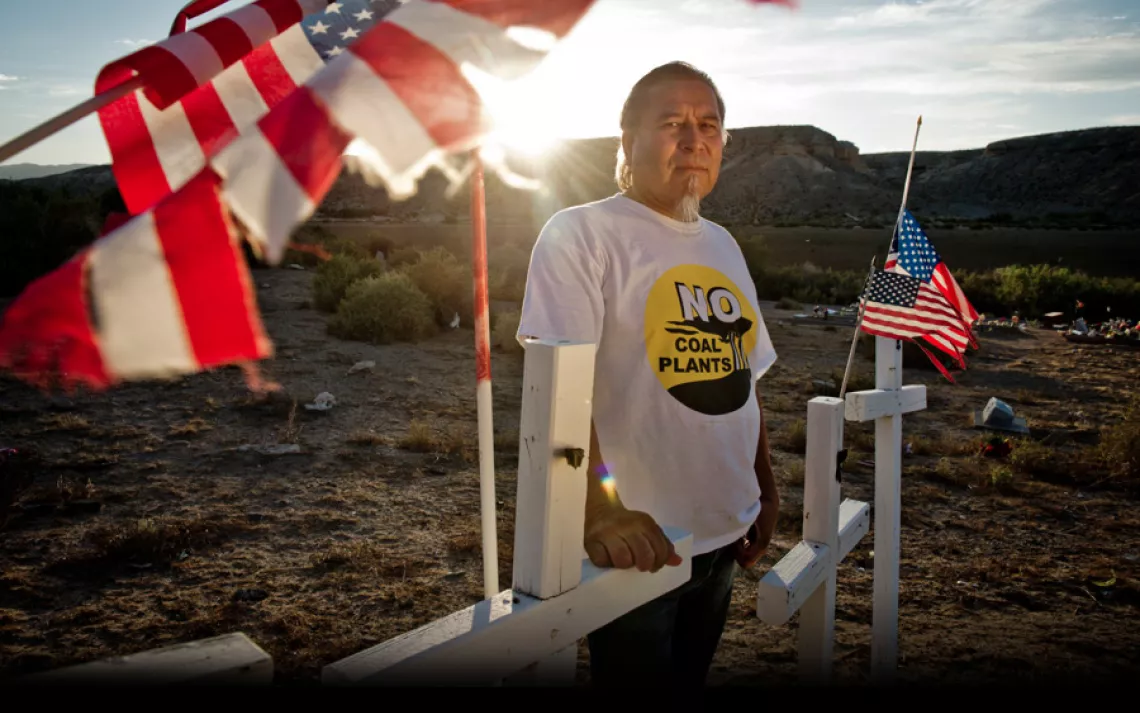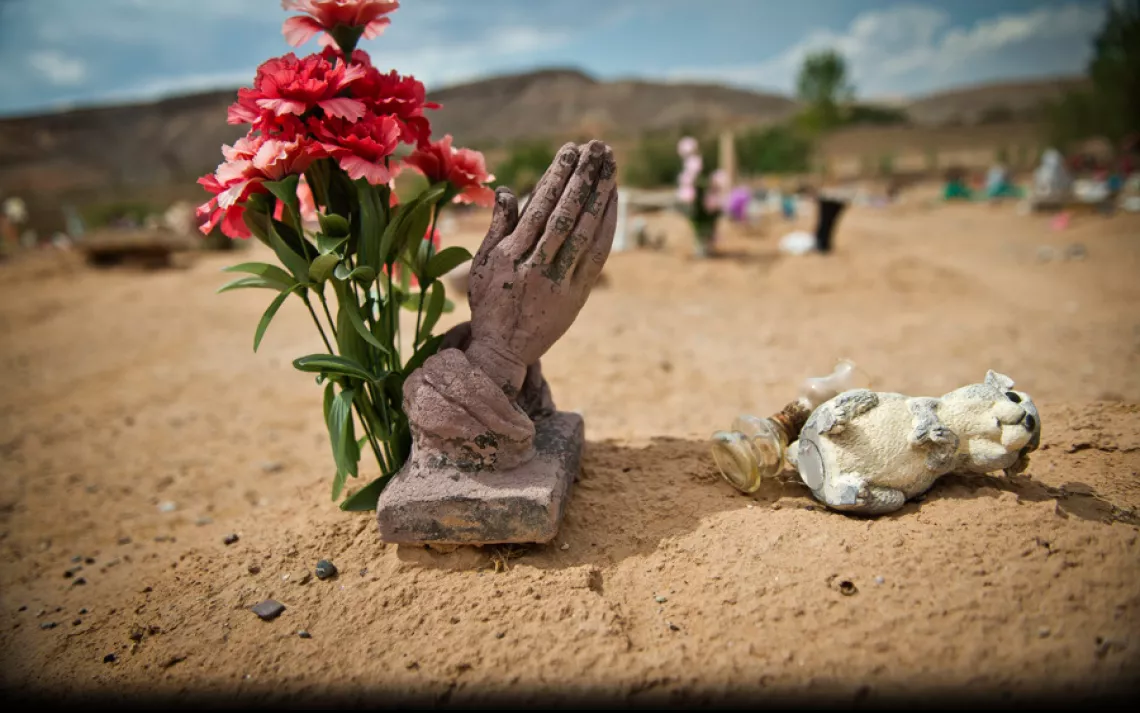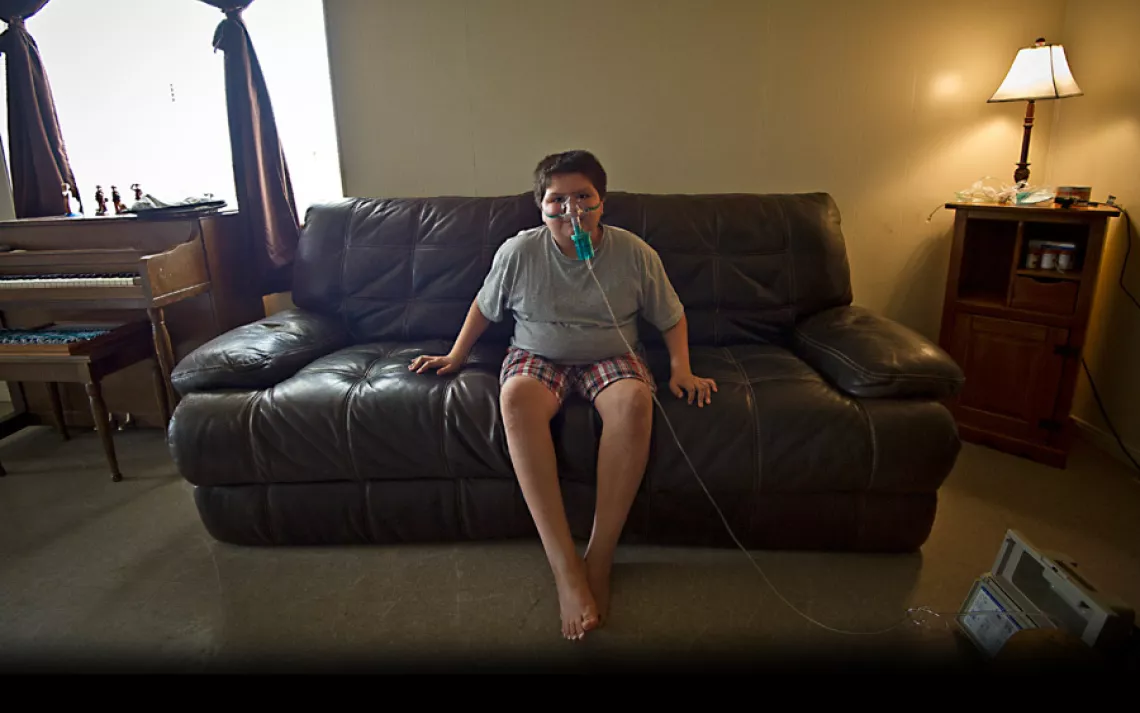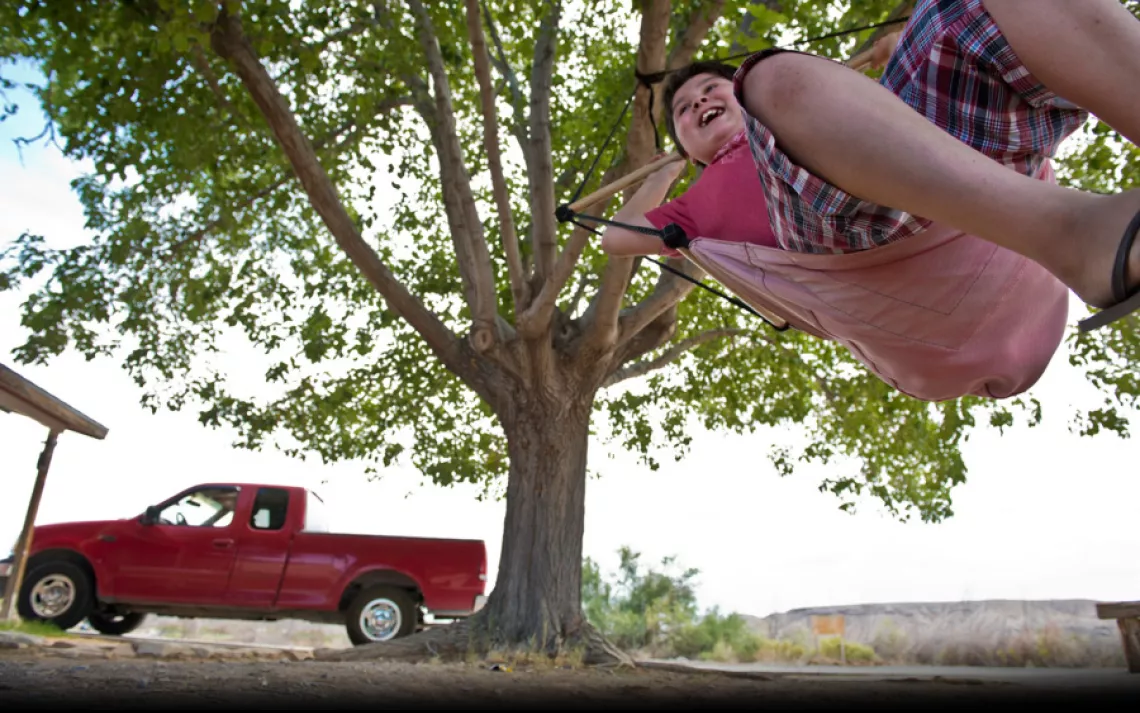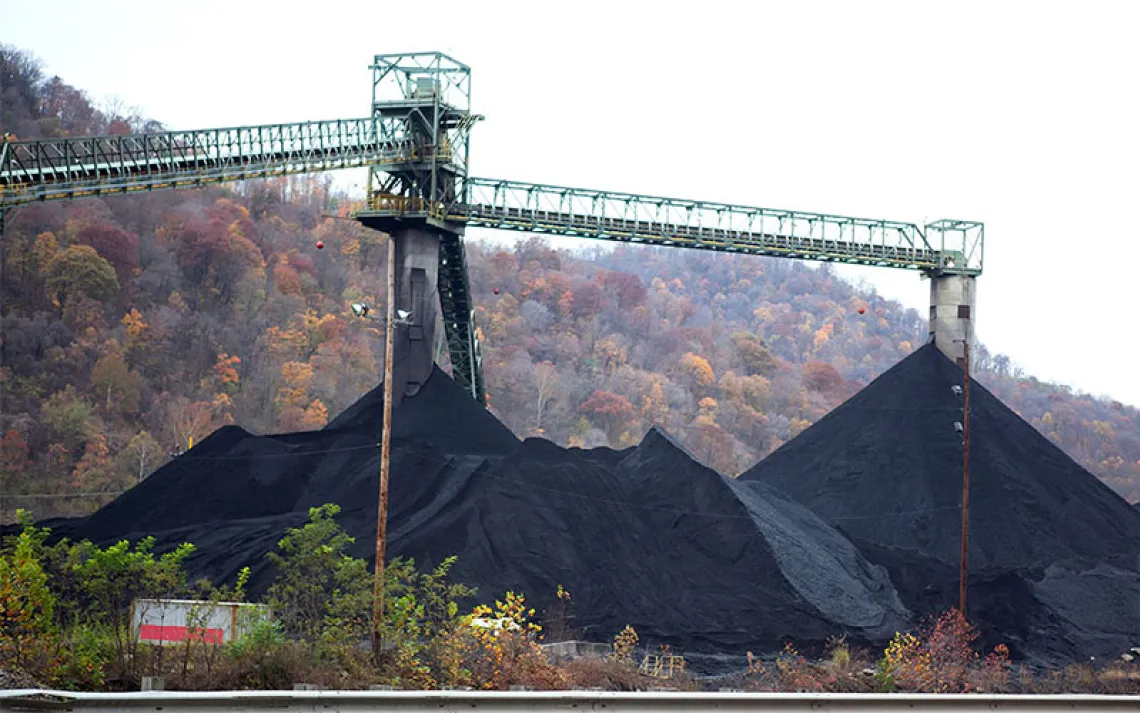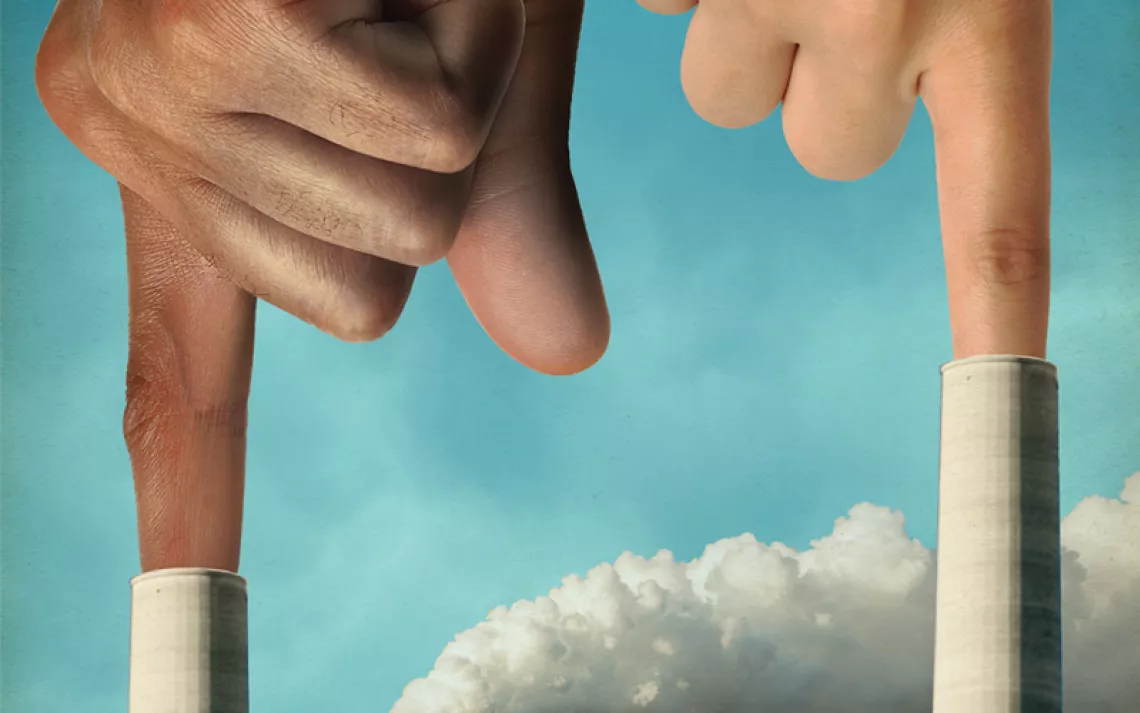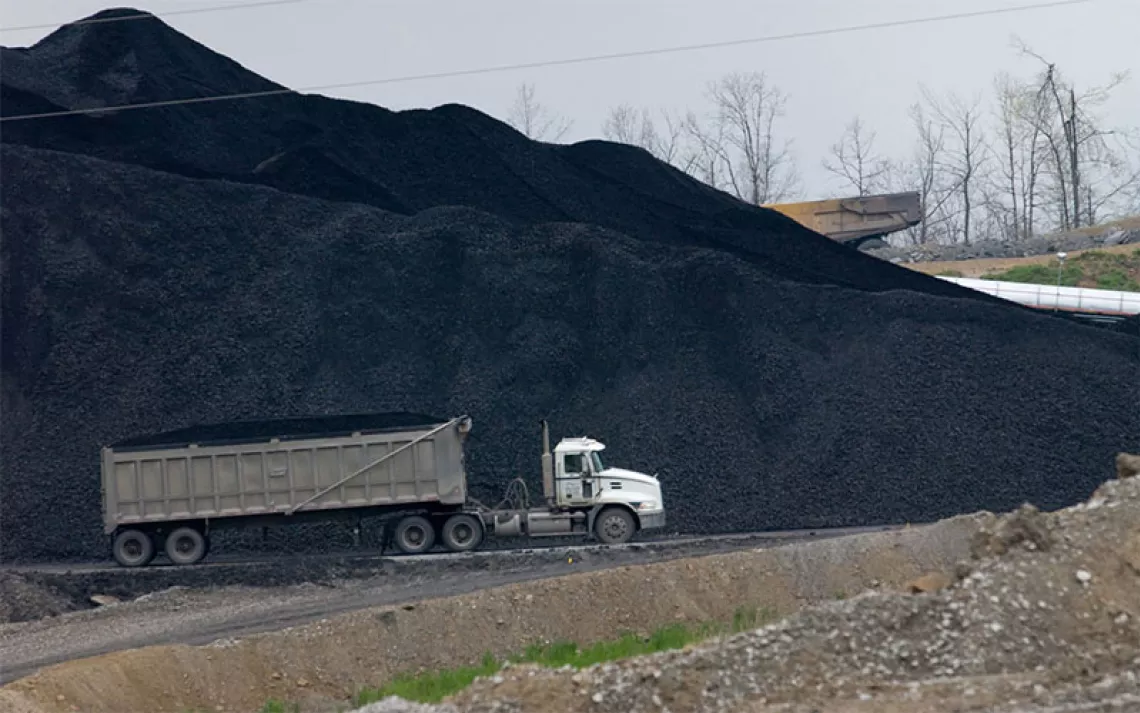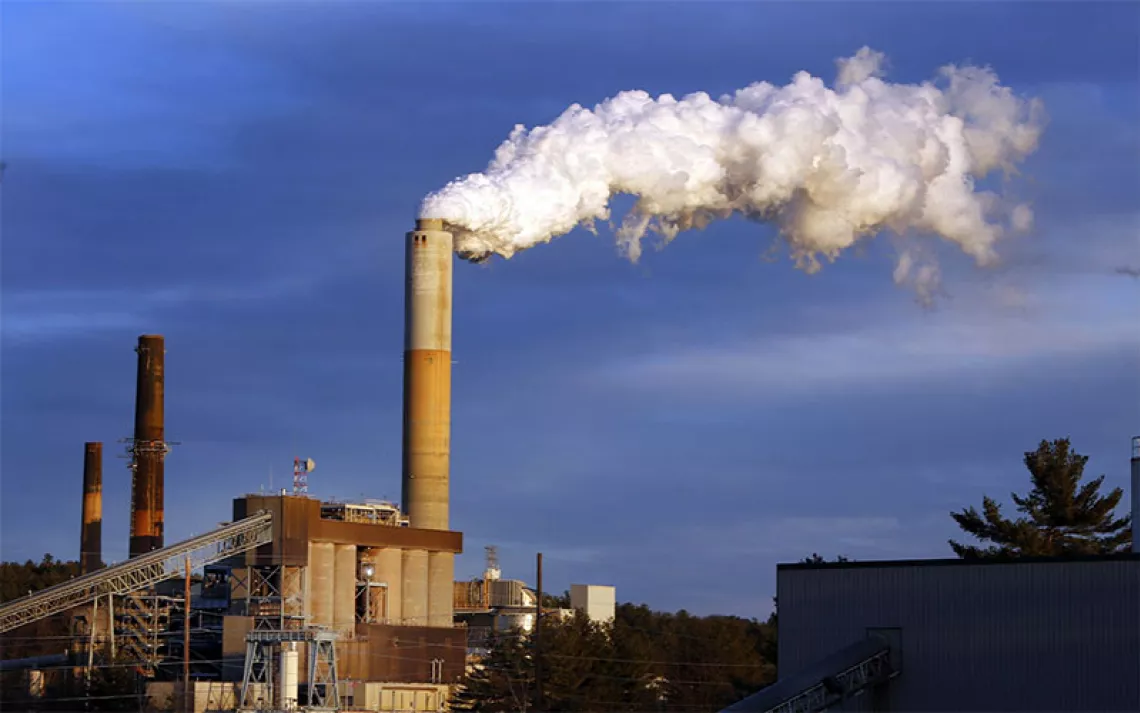The Cost of Coal, Disposal: Nevada
The coal-fired Reid Gardner Generating Station dumps its combustion waste into uncovered "ponds" beside the Moapa Band of Paiutes Reservation
Since 1965, the coal-fired Reid Gardner Generating Station, about 50 miles northeast of Las Vegas, has dumped its combustion waste into uncovered "ponds" beside the Moapa Band of Paiutes Reservation.
Tribal members believe that the coal ash—which contains mercury, arsenic, selenium, and other toxins and blows into their village in dust storms—has caused asthma attacks, cancer, heart disease, and many premature deaths among the 200 residents there. More than 1,100 coal-ash sites exist nationwide; none is subject to federal regulation.
Photos by Ami Vitale/Panos Pictures
Vernon Lee
Moapa, Nevada
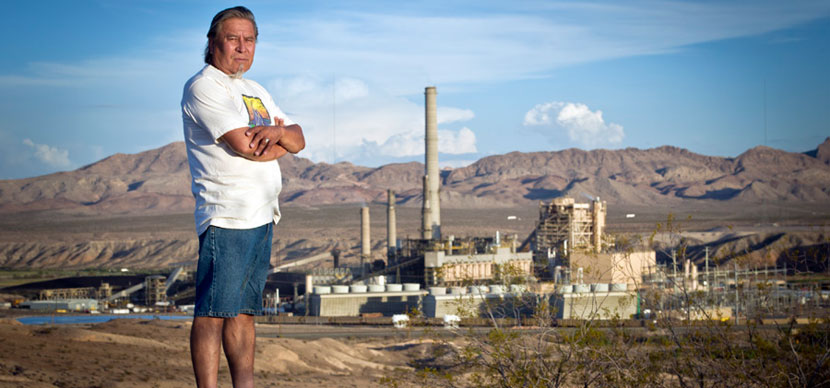
Vernon Lee at the Moapa tribal cemetery. "Last year we averaged one funeral every two months," he said. "That's out of about 200 people who live here."
There's a lot of funerals. Last year we averaged one funeral every two months. That's out of about 200 people who live here. I don't know what it's going to be like here in another 10 or 20 years. There may be very, very few elders. That's just the sad truth.
It's my belief that decades of exposure to that coal ash has turned us into damaged people. It's got to be a contributing factor. Anytime the wind blows this way, we get a direct hit. And we're so close it doesn't have time to dissipate, so it's heavily laden with all these bad things. Mercury. Arsenic. Lead.
As people started discussing it among themselves, it was undeniable that something was going on. There was a lot of lupus, a lot of thyroid problems. Kids were suffering from nosebleeds. Everybody had asthma and allergies. A lot of people with lung problems.
All the suffering going on here, they don't include that in the cost of cheap coal. (Interviewed July 2012)
Surita Hernandez
Moapa, Nevada

Surita Hernandez at her home on the Moapa Band of Paiutes Reservation in Nevada; she and four of her five children have asthma. "It just seems like everybody around here has some kind of health problem," she said.
When it's windy, you can feel it and taste it--the dust. I guess it's the ash. It's like a dark cloud. When it comes, we usually don't go out, but it'll still come in through the cracks and vents.
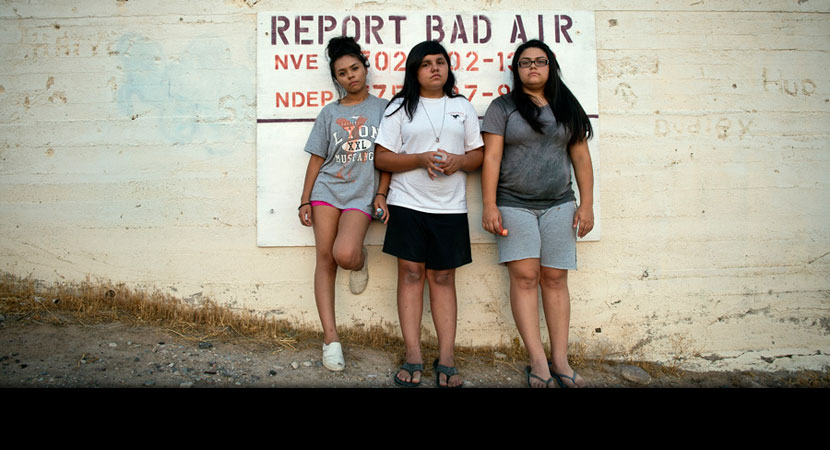
Aaliya, Ayona, and Zayda Hernandez near their home on the Moapa Band of Paiutes Reservation, about an hour north of Las Vegas. Since 1965, coal ash from the Reid Gardner Generating station has been dumped into uncovered ''ponds'' less than a half-mile from their neighborhood.
Four of my five kids have asthma. My oldest daughter, Aaliyah, they first told me she had asthma when she was a few months old.

Gyiel Hernandez demonstrates his inhaler. "When he was a couple of months old, I had to take him back to the hospital because of asthma," said his mother, Surita.
My second daughter, Zayda, she kept getting sick. My mom took her to the doctor one day when she was six or seven, and they had to call the LifeFlight helicopter because her breathing was so low. They called me at work, and I just started crying right there.

Zayda Hernandez, left, stands on rocks with her cousin Edgar Perez on the Moapa Band of Paiute Reservation.
My son, Gyiel, when he was a couple of months old, I had to take him back to the hospital because of asthma. And then my youngest, Ayashi, she was two weeks old when we had to take her back for some kind of respiratory issue. That's when they gave us a nebulizer to use at home.
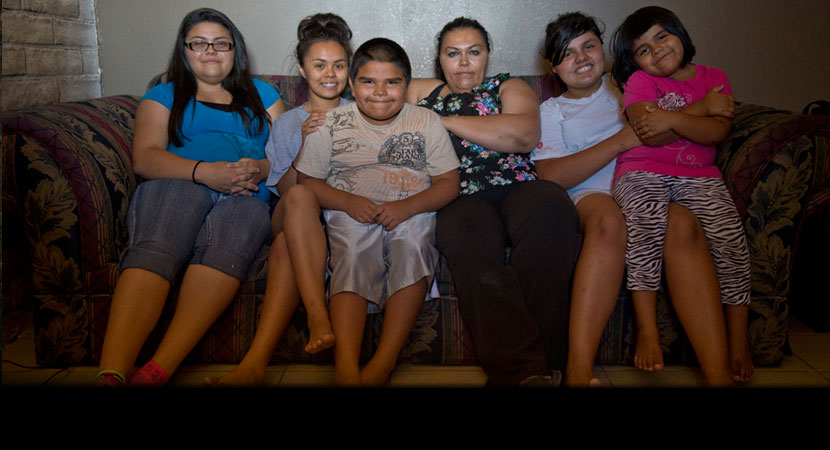
From left: Zayda, Aaliya, Gyiel, Surita, Ayona, and Ayashe Hernandez at their home on the Moapa Band of Paiutes Reservation. "When it's windy, you can feel it and taste it -- the dust. I guess it's the ash," Surita said. "When it comes, we usually don't go out, but it'll still come in through the cracks and vents."
It just seems like everybody around here has some kind of health problem. My own family's health problems--I can't say for sure it's because of the plant. But I do know that the plant has all those chemicals and the bad stuff flowing from there, and it's right behind our yard. That's the thing to me: that we don't know. (Interviewed on July 22, 2012)
William Anderson
Moapa, Nevada

I'm the chairman for the Moapa Band of Paiutes. We've been utilizing this land and the river for farming for many generations. We've been here forever.
We have over 71,000 acres of land here, and we've set aside about 2,000 acres to build a solar energy plant. What we're trying to do is find a solution to help our people breathe clean air. We want to show that we're taking the effort to be more responsible with the land, to provide something that's clean and safe.
This is not just for us, but also for the people who live nearby. If the power plant were to shut down, the job loss would be negative on the whole area. That's why we're trying to come up with a solution that provides economic development, so we can hire more and more people from the surrounding community.
We want to create jobs, and we want to show our neighbors that there are ways to produce energy other than polluting the earth. (Interviewed July 19–20, 2012)
Kami Miller
Moapa, Nevada

Kami and Lane Miller at their home on the Moapa Band of Paiutes Reservation in Nevada.
Growing up here, everyone knew everybody. We were active. We had a little park down the road. There was a swing set, slide, the little bendable horses.
It was fun. We had trails in the hills. You just walked around. No technology or the advances they have now, where everybody just stays inside.

Lane Miller demonstrates using his nebulizer in his home on Nevada's Moapa Band of Paiutes Reservation. "At least once a month he has to use a nebulizer to open up his lungs," his mother, Kami, said. "If I neglect it, he has to go on steroids or it can turn into pneumonia or bronchitis."
We were living here in Moapa when I was born. Then we moved to Vegas but came back when I was 10. That's when I started having to use an inhaler. I'm 37 now and I still use it. A month ago I went to Oregon and didn't use my inhaler at all. But as soon as I got back to our area, I was sucking on it.

Sign up to receive Sierra News & Views
Get articles like this one sent directly to your inbox weekly.
With this action you affirm you want to receive Sierra Club communications and may vote on policy designated by the Sierra Club Board.

"He's a little bleeding heart," Kami Miller said of son Lane. "When he hears his mommy cry, he gets a little teary-eyed himself."
My son has the same problems. He has an inhaler, and at least once a month he has to use a nebulizer to open up his lungs. If I neglect it, he has to go on steroids or it can turn into pneumonia or bronchitis.
These people who come in and haul away the fly ash from the plant say it's not harmful. But I say, "If it's not harmful, why does your wife have to check you to make sure you didn't bring any into the house? Why does the paint peel on your vehicle after you've been out there on a rainy day?"
Sometimes I wonder, Where did my son's autism come from? I grew up on the hill above the tribal building, and I always wonder if it started there, with his development, because that's where I was living when I was pregnant with him. The dust from the plant would come through the valley and then come up to us. We lived there for 10 years, and then I inherited a house down here, closer to the plant.
It's a miracle when people reach age landmarks here. Fifty is a miracle around here. I left last week for a business meeting and came home to two elders, two brothers, in the hospital. The driver who picked us up is like, "Russell and Calvin are in the hospital." For those two brothers to be in the hospital at the same time, how do you deal with that? They have another brother, Randy, and in one fell swoop there could be just the one brother left.
We have a small cemetery with little family plots, and ours is filling up. It's kind of warped, because we're like, "We might have to move our family plot to accommodate all the people who are dying."
I hope to be buried there, but I don't see it in the near future--at least I hope not. I have a son to look out for. My lungs, you know, if they don't hold up . . . or what if it moves to where my heart doesn't work? It makes a deep impact, because I want to be here for my son.
It's OK, sweetie. Mommy's just crying because she's happy, OK? He's a little bleeding heart. When he hears his mom cry, he gets a little teary-eyed himself. (Interviewed July 19, 2012)
Jennifer Samson
Moapa, Nevada
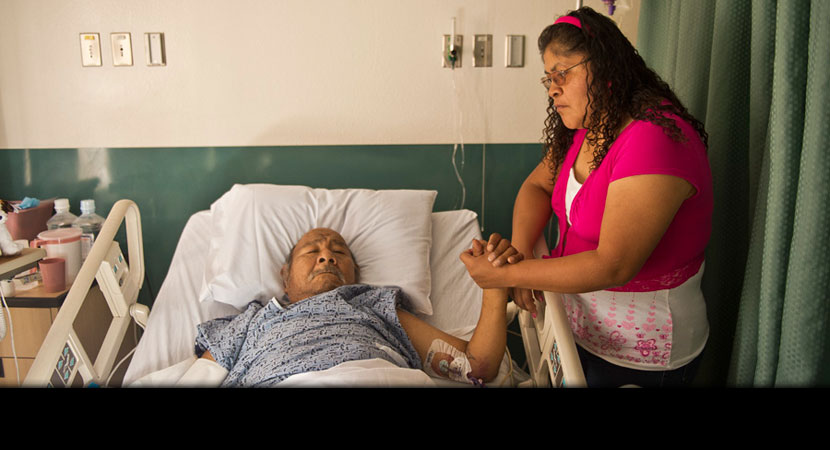
Jennifer Samson pays a hospital visit to her cousin Russell Samson, who died less than two weeks later. In a TV interview shortly before he was hospitalized, Russell said that power plant emissions had made him sick: "This got inside my chest, my lungs, where I couldn't breathe."
My parents passed a long time ago. All my brothers and sisters are gone except for my half-sister--she's up in Reno. I'm the only one left. I'm the last one on the kaboodle.
Russell and Calvin, the boys, they're brothers and they live together. They went through so much in their life, living down there right next to the plant. When they started staying down there, you could smell it. Anywhere you go, you could smell it. I always told them, "If you want to get away anytime, come up to my house."
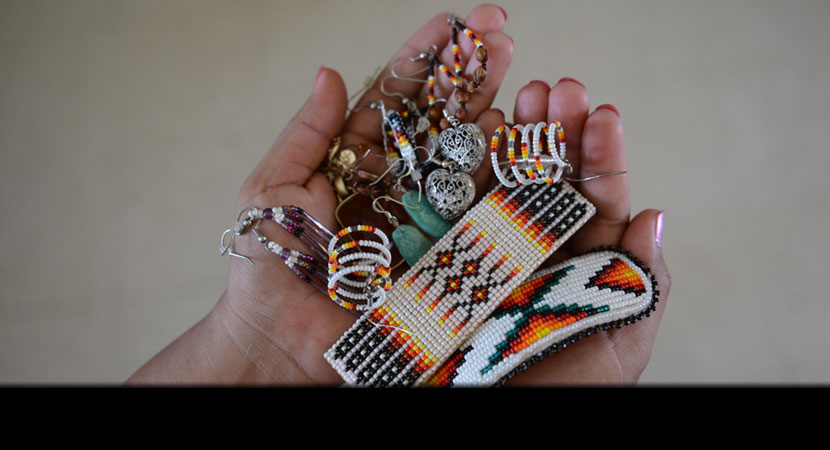
Jennifer Samson displays some jewelry given to her by her cousin Russell Samson, who died less than two weeks after this photo was taken.
Calvin is my first cousin, but I look at him as my brother. And Russell, he's also my first cousin, but I look at him as a dad and a brother and an uncle and my best friend that ever came into my life.
We have nicknames for each other. We know these ladies, they can't say "Russell" and they always call him "Wushell." So I always call him "Wushell." And they can't say "Jennifer" either. They call me Juniper. So when he calls me, he always says, "You're my Juniper." That's just between me and him.
Now that they're both in the hospital, I go down and check their messages and feed their dog and just do what I have to do. But I just can't stay there very long now. I know where they're at now, and I'm used to having them with me. I've got the memories. (Interviewed July 20, 2012. Russell Samson died of cancer in early August.)
THE COST OF COAL
Videos | Photo Gallery | West Virginia | Michigan | Nevada
 The Magazine of The Sierra Club
The Magazine of The Sierra Club
